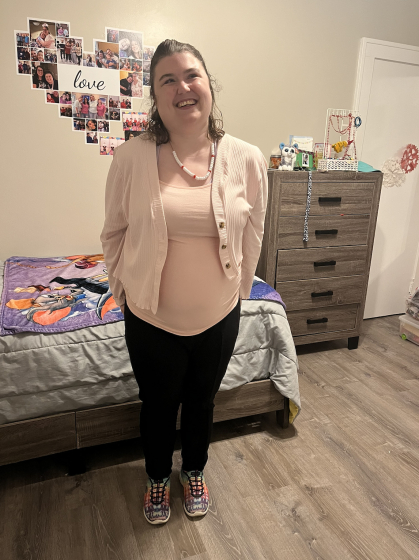Rutgers’ Community Living Project: Vital Resource?
When Carmelys Vincent was discharged from the hospital and placed in a nursing home, the expectation was that she would remain there long-term. But Vincent, a fierce self-advocate, had other plans.
Living among dozens of residents in a long-term care facility for the elderly didn’t match the aspirations of a young woman with developmental disabilities. She dreamed of having a job where she could help others. She craved independence – and tending her own garden.
Soon after arriving, Vincent began searching online for a way out. That’s when she discovered CLEP – the Community Living Education Project at the Rutgers School of Public Health.
“How CLEP was involved and what they have done for me is just extraordinary,” said Vincent, who has since moved into a small group home in Piscataway, N.J. “The fact that I feel safe can create relationships and call this a home is the most beautiful thing.”
For more than three decades, CLEP has been a lifeline for thousands of New Jersey adults with intellectual and developmental disabilities seeking community living and support services. Founded in 1991 as the Family Support Project at the Rutgers School of Social Work, CLEP became an essential state resource after the Olmstead Decision, the landmark 1999 Supreme Court ruling that affirmed the right of people with disabilities to live in community-based, noninstitutional settings.
In the years since, CLEP has played a central role in supporting individuals and their families as they prepare to explore varied residential options in the community.
But that support may soon disappear.
On July 1, CLEP is set to shut down – its $545,000 in annual state funding eliminated as part of a $2.6 million cost-saving in the proposed budget for the New Jersey Division of Developmental Disabilities. Now, as CLEP pushes for a reprieve from state cuts and searches for new funding – including from the federal government – proponents warn that without the organization, many families will be left to navigate an already complicated system on their own.
As children with developmental disabilities become adults, many are eligible for services such as housing, assistance from support staff and job coaching. But the adult system operates under a different set of agencies and rules, sometimes leaving families confused and overwhelmed.
For parents of teenagers approaching adulthood, the transition comes at a vulnerable time – when they are wrestling with long-term care decisions and facing a tangle of bureaucracy.
That’s when CLEP steps in. Staffed in part by parents of children with similar needs, the program acts as a personal guide and navigator. It helps families understand their options, coordinate care and, most importantly, center decisions on the individual.
“We’re unique,” said Colleen McKay Wharton, CLEP project director. “We know the system well, and we empower families to explore all options in community living so they can make the most informed, person-centered decision.”
Melanie McGackin, whose son transitioned to adult services with CLEP’s help, said she felt a profound shift once CLEP got involved. Before, conversations with providers had focused largely on her son’s support needs – ignoring his personality, talents, hopes and dreams.
“CLEP sat at the table with my family and made sure we were talking about my son’s strengths – what brings him joy – as well as his complex care requirements,” said McGackin, who is now a CLEP senior training and consultation specialist.
McGackin’s family faced considerable challenges in identifying an appropriate residential option that could fully support her son. Through CLEP, they meet with numerous community residential providers to consider the best path forward.
As a result, her son lives in a provider-managed group home with two others. There, with the needed supports in place, he has had opportunities to fully participate in his community, in ways that bring him joy.
“None of that would have happened without CLEP walking beside us,” she said.
The state’s Department of Human Services funds support coordinators to help individuals in gaining access to needed program and services, but experts said CLEP’s deep, individualized approach is an important complement.
“The transition from the children’s system to the adult system is so complex, so overwhelming, that without an organization like CLEP – one that humanizes the process – I don’t know how families could manage,” said Valerie Sellers, chief executive of the New Jersey Association of Community Providers.
“CLEP is, in my opinion, as essential as any state agency – maybe more – because of the way they connect with families.”
Anna Marie Perrone agrees. When her daughter, Shannon Lewis, was looking to transition from the family home into a small group home in 2022, CLEP served as a communication bridge, sharing her daughter’s likes, dislikes, habits and behaviors with potential providers.
“That was a big help to some of the group homes to make a decision on whether Shannon was a good fit,” said Perrone.
If CLEP is shuttered, Sellers said it could signal a broader step backward for disability rights in New Jersey. Combined with proposed cuts to Medicaid, the closure of CLEP could drive families back toward institutional care – a model the Olmstead ruling sought to reduce.
“If there’s no expansion of services, and no CLEP to help families navigate the system, then institutions become the default,” she said. “That’s inconsistent with everything Olmstead stands for.”
Wharton agrees that these are concerning times for her organization, and for the many families that it supports.
“People have the right to live lives of choice, and the right to self-determination,” said Wharton.
For people such as Carmelys Vincent, Melanie’s son, Shannon Lewis and thousands of others, CLEP’s engagement has been transformational.
If CLEP closes its doors on July 1, “who will assist these families as they navigate through such pivotal moments in their lives?” Wharton asked.
https://www.rutgers.edu/news/rutgers-community-living-education-project-vital-resource-borrowed-time
View Original | AusPol.co Disclaimer
